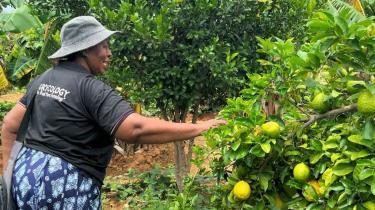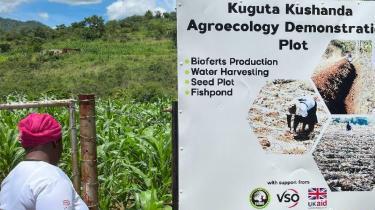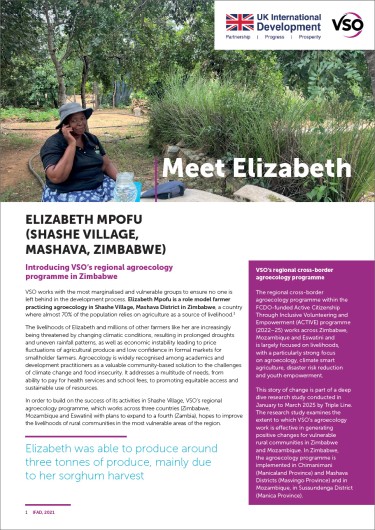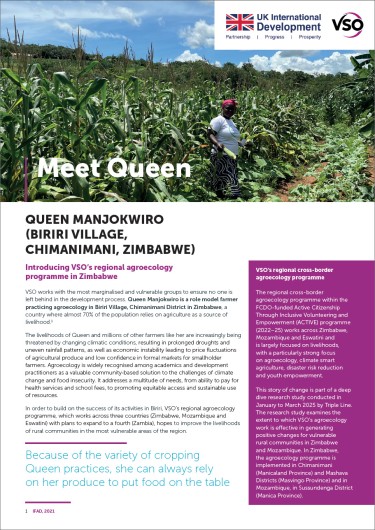New evidence from our in-depth study for VSO and FCDO demonstrates the power of agroecology to improve incomes, nutrition, and climate resilience for smallholder farmers in Zimbabwe and Mozambique, with significant policy implications.
VSO commissioned Triple Line to conduct a deep dive study into the impact of the Active Citizenship Through Inclusive Volunteering and Empowerment (ACTIVE) programme. Our research, conducted early in 2025, provides robust evidence of the programme's effectiveness in delivering positive change for farmers.
Farmers See Tangible Benefits and Greater Resilience
The VSO ACTIVE programme successfully supports smallholder farmers to adopt low-input, diversified agroecological practices. Our research found that participants in marginal farming areas of Zimbabwe and Mozambique are reporting:
- Higher Incomes: From the sale of surplus production.
- Improved Food Security: Leading to better nutrition and healthier household diets.
- Greater Confidence: Farmers feel more secure and better equipped to cope with increasingly erratic climate conditions.
While adoption is currently limited to a small proportion of farmers, the study concludes there is strong potential for replication and scaling both within programme areas and more widely across the region.
Policy Influence: A National Milestone in Zimbabwe
The programme's success extends beyond the farm gate, demonstrating significant policy influence in Zimbabwe. VSO's training and advocacy work has strengthened community engagement with local officials, improving farmers' access to essential government services.
A major milestone was the 2024 publication of Zimbabwe's Agroecology Promotion Policy and Strategy. Developed with input from communities supported by VSO, this is a crucial step towards mainstreaming sustainable farming and signals growing national-level recognition.
Why Agroecology Works: Key Success Factors
Triple Line's study highlights several interconnected factors driving the programme's success:
- Accessibility: Agroecology has low barriers to entry and synergies with the environment, making it a practical and suitable approach for smallholder farmers in climate-affected areas.
- Multi-dimensional Impact: The programme addresses poverty on multiple fronts, enhancing incomes, nutrition, and social capital, in addition to crop yields.
- Empowered Communities: Training has strengthened farmers' capacity to realise their rights and hold local officials accountable for service provision.
- Strong Partnerships: VSO's ability to mobilise local partners and volunteers has been central to effective delivery.
- National Recognition: The new Agroecology Strategy provides a vital platform for future government recognition and investment.
Project Overview: Triple Line's Role
The agroecology work is part of the broader ACTIVE programme, which is funded by the FCDO and has been extended to 2028. The programme focuses on livelihoods, climate-smart agriculture, disaster risk reduction, and youth empowerment across Zimbabwe, Mozambique, and Eswatini.
Triple Line's expertise was employed to rigorously assess the programme's effectiveness and gather robust evidence of early impact between January and March 2025. Our work specifically focused on how the interventions helped "primary actors" improve livelihoods and climate adaptation.
Read the Stories of Change: To bring the research to life, we documented the personal experiences of two Zimbabwean smallholder farmers. Download the two documents below to read about how agroecology is shaping real lives and livelihoods.
The Way Forward
The evidence is clear: when supported by strong partnerships and policy frameworks, agroecology offers a sustainable pathway for smallholder farmers to adapt to climate change, build resilience, and secure their livelihoods.
Scaling up these proven successes will require continued commitment from domestic governments, regional cooperation, and sustained investment in farmer-led innovation.
If you would like to learn more about Triple Line's in-depth research capabilities or our work in the development space, please get in touch with the team today.







